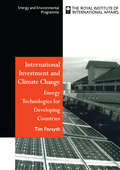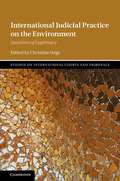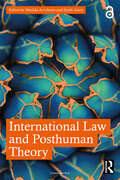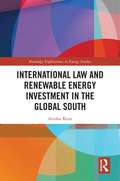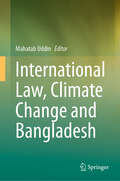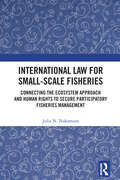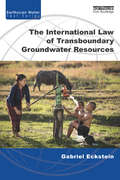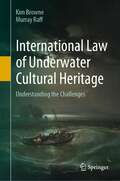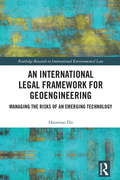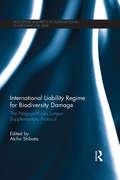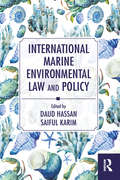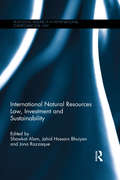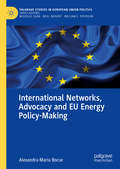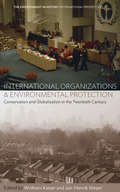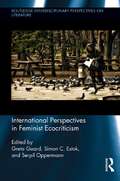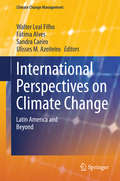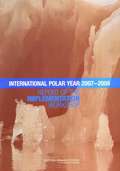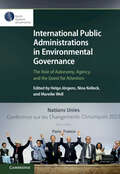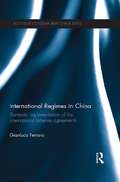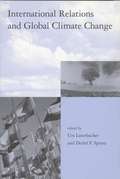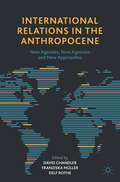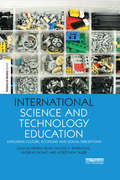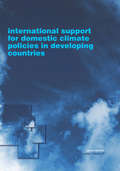- Table View
- List View
International Investment and Climate Change: Energy Technologies for Developing Countries
by Timothy ForsythThis study, based on fieldwork and case studies of southeast Asian countries shows how privatization, investment and new energy technologies can be integrated to combat climate change and provide the maximum return for investors. The author explains what incentives and regulatory structures are needed that do not damage local competitiveness. Asserting that technology transfer is fundamental to effective policies for climate change and for economic development, the text examines how the benefits can be maximized.
International Judicial Practice on the Environment: Questions of Legitimacy (Studies on International Courts and Tribunals)
by Christina VoigtMore and more environmental cases are being heard and decided by international courts and tribunals which lack special environmental competence. This situation raises fundamental questions of legitimacy of the environmental practice of international courts. This book addresses inter alia questions of who has legal standing to bring an environmental claim before an international court, on which legal norms is the case decided and whether judges have the necessary expertise to adjudicate environmental cases of often complex nature. It analyses which challenges international courts face, which possibilities they have and which advances international judicial practice has been able to make in protecting the environment. Through the prism of legitimacy important insights emerge as to whether international courts and tribunals are fit for addressing some of the most pressing global challenges of our time.
International Law and Posthuman Theory
by Matilda Arvidsson Emily JonesAssembling a series of voices from across the field, this book demonstrates how posthuman theory can be employed to better understand and tackle some of the challenges faced by contemporary international law. With the vast environmental devastation being caused by climate change, the increasing use of artificial intelligence by international legal actors and the need for international law to face up to its colonial past, international law needs to change. But in regulating and preserving a stable global order in which states act as its main subjects, the traditional sources of international law – international legal statutes, customary international law, historical precedents and general principles of law – create a framework that slows down its capacity to act on contemporary challenges, and to imagine futures yet to come. In response, this collection maintains that posthuman theory can be used to better address the challenges faced by contemporary international law. Covering a wide array of contemporary topics – including environmental law, the law of the sea, colonialism, human rights, conflict and the impact of science and technology – it is the first book to bring new and emerging research on posthuman theory and international law together into one volume. This book’s posthuman engagement with central international legal debates, prefaced by the leading scholar in the field of posthuman theory, provides a perfect resource for students and scholars in international law, as well as critical and socio-legal theorists and others with interests in posthuman thought, technology, colonialism and ecology.
International Law and Posthuman Theory
by Matilda Arvidsson Emily JonesAssembling a series of voices from across the field, this book demonstrates how posthuman theory can be employed to better understand and tackle some of the challenges faced by contemporary international law.With the vast environmental devastation being caused by climate change, the increasing use of artificial intelligence by international legal actors and the need for international law to face up to its colonial past, international law needs to change. But in regulating and preserving a stable global order in which states act as its main subjects, the traditional sources of international law – international legal statutes, customary international law, historical precedents and general principles of law – create a framework that slows down its capacity to act on contemporary challenges, and to imagine futures yet to come. In response, this collection maintains that posthuman theory can be used to better address the challenges faced by contemporary international law. Covering a wide array of contemporary topics – including environmental law, the law of the sea, colonialism, human rights, conflict and the impact of science and technology – it is the first book to bring new and emerging research on posthuman theory and international law together into one volume.This book’s posthuman engagement with central international legal debates, prefaced by the leading scholar in the field of posthuman theory, provides a perfect resource for students and scholars in international law, as well as critical and socio-legal theorists and others with interests in posthuman thought, technology, colonialism and ecology.Chapters 1, 9 and 11 of this book is freely available as a downloadable Open Access PDF at http://www.taylorfrancis.com under a Creative Commons Attribution-Non Commercial-No Derivatives (CC-BY-NC-ND) 4.0 license.
International Law and Renewable Energy Investment in the Global South (Routledge Explorations in Energy Studies)
by Avidan KentThis book will discuss the legal tools offered by international law that can support foreign direct investment (FDI) in the renewable energy sector in the Global South. Promoting and increasing investment in the renewable energy sector is crucial for limiting global temperature rise to 1.5°C and addressing energy poverty in the Global South. In this volume, Kent explores the various home-country measures (HCMs) offered by international law that support FDI in the renewable energy sector. This book provides a bird’s eye evaluation of HCMs from fields such as trade law, investment law, environmental law, development law and more. It reveals that while international law indeed offers many legal tools to support investors’ needs, the current legal framework is fragmented; most legal instruments were designed in isolation and the potential for mutually-supportive, synergetic policies has been explored only to a limited extent. This fragmented reality is in contradiction to the notion of Policy Coherence for Development, which is increasingly gaining support in leading institutions in Europe and elsewhere. This book will provide recommendations on the manner in which HCMs can be connected in order to maximise their potential and boost investment in renewable energies in the developing world. International Law and Renewable Energy Investment in the Global South will be of great interest to scholars, students, and practitioners of international law, energy studies, development studies and IR more broadly.
International Law, Climate Change and Bangladesh
by Mahatab UddinThis book explores the possibilities and scope of facilitating Bangladesh’s battle against climate change with regard to relevant international legal instruments, as well as national laws and policies. The Post-Paris global climate regime considers adaptation, mitigation, climate finance, technology transfer, capacity building, and compensation for losses and damage associated with climate change as essential tools for combating it. This book includes chapters on each of the above topics. Additionally, it covers integrating digital technologies in climate-smart agricultural practices, government land acquisition practices and their repercussions on changing land conditions, the legal landscape overseeing climate change and foreign direct investment, and the regulatory interplay between domestic trade and climate policies in Bangladesh. The book comprehensively covers climate justice issues by addressing climate-induced migration, access to clean water, gender-responsive climate action, public interest environmental litigation, and, above all, the climate-change-development nexus in Bangladesh. This book is intended for researchers, policymakers, university students, and practitioners in international environmental law and climate change law.
International Law for Small-Scale Fisheries: Connecting the Ecosystem Approach and Human Rights to Secure Participatory Fisheries Management
by Julia N. NakamuraThis book provides an original and groundbreaking account of the applicability and key contributions of international law to small-scale fisheries, a fisheries subsector that has been historically overlooked by governments and international legal scholarship.Small-scale fisheries constitute most of the world’s capture fisheries workforce; they sustain the livelihoods of fishers and their communities while building and transmitting traditional knowledge and culture. Significant attention has been given to small-scale fisheries by the international community over the past decade, building the momentum for dedicated research on such a topic. Nevertheless, the literature examining small-scale fisheries from an international legal perspective remains scarce. This book fills this gap by systemically examining different international legal regimes to unravel the normative foundations for securing the meaningful participation of small-scale fisheries peoples in international fisheries management. It connects the ecosystem approach, a key principle of international fisheries law, and the human rights regime to elucidate the benefits that participatory international fisheries management brings to enhance both the ecological and social aspects of fisheries sustainability. It also examines the extent to which fisheries governance is democratic, and provides an enabling framework for the integration of fishers’ knowledge into international fisheries management. It is thereby oriented toward more justice and fair outcomes for small-scale fisheries.This book will be a valuable resource for academics and researchers with an interest in the governance of fisheries in international law, the law of the sea, environmental law, and human rights law, as well as to practitioners and policymakers working on the development and implementation of laws and policies governing fisheries and natural resources.
The International Law of Transboundary Groundwater Resources (Earthscan Water Text)
by Gabriel EcksteinThis book provides a comprehensive review of the state of international law as it applies to transboundary groundwater resources and aquifers. The main focus is on recent developments and the emerging international law for transboundary aquifers as reflected in the practice of states and the work of the UN International Law Commission, UN Economic Commission for Europe, and International Law Association. The author takes an interdisciplinary approach to the subject matter and provides the scientific hydro-geological underpinning for the application of law and policy to transboundary groundwater resources. He also addresses the growing global dependence on this hidden resource, as well as both the historical and scientific context for development of the law. The book provides case examples throughout to illustrate the various concepts and developments. These include more detailed examinations of the few existing transboundary aquifer agreements in operation, such as for aquifers between France and Switzerland and Jordan and Saudi Arabia, as well as aquifers in North Africa and in South America.
International Law of Underwater Cultural Heritage: Understanding the Challenges
by Kim Browne Murray RaffThis book brings together three distinct areas of International Law – namely Environmental, Heritage and Ocean Law – to address the international legal protection of historically significant wrecks, with particular focus on the environmental hazards they may pose. The confluence of Heritage Law and the Law of the Sea with International Environmental Law represents an important development in international governance strategies for the twenty-first century, in particular those legal and administrative regimes that concern the world’s oceans and underwater cultural heritage protection. Importantly, connections between international legal regimes, such as the 1982 Law of the Sea, and institutions like the International Maritime Organisation (IMO) and United Nations Education Scientific Cultural Organisation (UNESCO), can play a crucial part in governance strategies that involve the regulation of marine pollution and historic shipwrecks.
An International Legal Framework for Geoengineering: Managing the Risks of an Emerging Technology (Routledge Research in International Environmental Law)
by Haomiao DuGeoengineering provides new possibilities for humans to deal with dangerous climate change and its effects but at the same time creates new risks to the planet. This book responds to the challenges geoengineering poses to International Law by identifying and developing the rules and principles that are aimed at controlling the risks to the environment and human health arising from geoengineering activities, without neglecting the contribution that geoengineering could make in preventing dangerous climate change and its impacts. It argues first that the employment of geoengineering should not cause significant environmental harm to the areas beyond the jurisdiction of the state of origin or the global commons, and the risk of causing such harm should be minimized or controlled. Second, the potential of geoengineering in contributing to preventing dangerous climate change should not be downplayed.
International Liability Regime for Biodiversity Damage: The Nagoya-Kuala Lumpur Supplementary Protocol (Routledge Research in International Environmental Law)
by Akiho ShibataThe Nagoya-Kuala Lumpur Supplementary Protocol on Liability and Redress to the Cartagena Protocol on Biosafety, adopted on 15 October 2010 in Nagoya, Japan, provides an international liability regime for biodiversity damage caused by living modified organisms (LMOs). Its adoption marks a significant development in the legal design for international environmental liability regimes, as it incorporates for the first time in global treaties an administrative approach to liability. This book examines the Supplementary Protocol from both practitioner and academic perspectives. In its three parts the book explores the historical development, legal significances, and future implementation of the core provisions of the Supplementary Protocol, focusing specifically on its incorporation of an administrative approach to liability for biodiversity damage and its relation to civil liability. Contributors to the volume include Co-Chairs of the negotiating group and the negotiators and advisors from some of the key negotiating Parties, offering valuable insights into the difficult-to-read provisions of the Supplementary Protocol. The book demonstrates the significant changes in the political configuration of environmental treaty negotiations which have come about in the twenty-first century, and argues that the liability approach of the Supplementary Protocol has important implications for future development of international liability regimes under international environmental law.
International Marine Environmental Law and Policy
by Daud Hassan Saiful KarimSeveral disturbing issues pose a threat to the marine environment and its wellbeing, among them marine environmental pollution and degradation of marine biodiversity. Most troubling is that these issues are overwhelmingly caused by human activities which are sometimes transboundary, and their consequences will become more severe and complicated if not properly curbed. Thus, these activities require comprehensive policies, laws, and principles to manage them effectively. Linked to these solutions is the need for responsibilities, cooperation and commitments at local, national, regional and international levels. Contemporary Marine Environmental Law and Policy presents a thorough appraisal of the main issues, actors and institutions engaged in the legal aspects of marine environmental conservation. With contributions from an international range of authors, the book provides a concise account of the legal and policy framework underlying international marine environmental issues, and of the fundamental concepts and strategies that are important to the protection of the marine environment. Some of the topics explored include: the prevention of marine pollution caused by land based activities, ships, and offshore hydrocarbon and mineral resources exploration; the conservation and management of marine living resources; the marine environment in the polar regions; and the settlement of marine environmental disputes. This book provides a solid foundation for anyone studying International Environmental Law and the Law of the Sea. It will also appeal to anyone seeking to gain a deeper understanding of this hugely important subject.
International Natural Resources Law, Investment and Sustainability (Routledge Research in International Environmental Law)
by Shawkat Alam, Jahid Hossain Bhuiyan and Jona RazzaqueInternational Natural Resources Law, Investment and Sustainability provides a clear and concise insight into the relationship between the institutions that govern foreign investment, sustainable development and the rules and regulations that administer natural resources. In this book, several leading experts explore different perspectives in how investment and natural resources come together to achieve sustainable development in developing countries with examples from water, oil and gas, renewable energy, mineral, agriculture, and carbon trading. Despite varying perspectives, it is clear that several themes are central in considering the linkages between natural resources, investment and sustainability. Specifically, transparency, good governance and citizen empowerment are vital conditions which encourage positive social, economic and environmental outcomes for developing countries. In addition, this book provides new insights into key concepts which underpin international law, including sovereign rights and state responsibility principles. It is clear from this book that in the attempt to reconcile these concepts and principles from separate legal regimes, complex policy questions emerge whereby it is difficult to attain mutually beneficial or succinct outcomes. This book explores how countries prioritise their policy objectives to achieve their notion of sustainable natural resource use, which is strongly influenced by power imbalances that inform North–South cooperation, as well as South–South cooperation in the international investment regime. This book will be of great interest to students, academics and researchers of international environmental law, international human rights law, international investment law and international economic law. This book may also be of relevance to environmentalists, policy-makers, NGOs, and investors working in the natural resources field.
International Networks, Advocacy and EU Energy Policy-Making (Palgrave Studies in European Union Politics)
by Alexandra-Maria BocseThis book explores the role which policy networks and particularly advocacy coalitions play in EU energy policy, and the factors that account for their policy success. It captures the often neglected interaction between public and private actors in EU energy security policy and between opposing advocacy coalitions. The volume’s case studies examine coalitions working on two issues central to EU energy policy debates over the last decade: fracking for shale gas and developing the Southern Gas Corridor, a pipeline system linking Europe with the gas region of the Caspian Sea. Although the coalitions studied are focused on impacting EU energy policy, they stretch beyond the EU borders. The book draws on original, rich, and intriguing data, around 90 interviews with energy stakeholders and over six months of fieldwork and participant observation, analysed through an innovative combination of frame analysis and social network analysis.
International Organizations and Environmental Protection: Conservation and Globalization in the Twentieth Century (Environment in History: International Perspectives #11)
by Jan-Henrik Meyer Wolfram KaiserPollution, resource depletion, habitat management, and climate change are all issues that necessarily transcend national boundaries. Accordingly, they and other environmental concerns have been a particular focus for international organizations from before the First World War to the present day. This volume is the first to comprehensively explore the environmental activities of professional communities, NGOs, regional bodies, the United Nations, and other international organizations during the twentieth century. It follows their efforts to shape debates about environmental degradation, develop binding intergovernmental commitments, and-following the seminal 1972 Conference on the Human Environment-implement and enforce actual international policies.
International Perspectives in Feminist Ecocriticism (Routledge Interdisciplinary Perspectives on Literature #16)
by Serpil Oppermann Simon C. Estok Greta GaardExploring environmental literature from a feminist perspective, this volume presents a diversity of feminist ecocritical approaches to affirm the continuing contributions, relevance, and necessity of a feminist perspective in environmental literature, culture, and science. Feminist ecocriticism has a substantial history, with roots in second- and third-wave feminist literary criticism, women’s environmental writing and social change activisms, and eco-cultural critique, and yet both feminist and ecofeminist literary perspectives have been marginalized. The essays in this collection build on the belief that the repertoire of violence (conceptual and literal) toward nature and women comprising our daily lives must become central to our ecocritical discussions, and that basic literacy in theories about ethics are fundamental to these discussions. The book offers an international collection of scholarship that includes ecocritical theory, literary criticism, and ecocultural analyses, bringing a diversity of perspectives in terms of gender, sexuality, and race. Reconnecting with the histories of feminist and ecofeminist literary criticism, and utilizing new developments in postcolonial ecocriticism, animal studies, queer theory, feminist and gender studies, cross-cultural and international ecocriticism, this timely volume develops a continuing and international feminist ecocritical perspective on literature, language, and culture.
International Perspectives on Climate Change
by Walter Leal Filho Fátima Alves Sandra Caeiro Ulisses M. AzeiteiroThis collected volume deals with emerging issues related to climate variation, climate change and adaptation technologies, with a special focus on Latin American countries. Presenting a variety of adaptation strategies and projects currently being undertaken and implemented, the book showcases how Latin American nations are struggling to meet the challenges of climate change. Latin America as a whole and Central America in particular is one of the most vulnerable regions of the world and is severely affected by recurrent extreme climate-related events. This volume documents and analyzes the main challenges and lessons learned, serving to disseminate knowledge beyond the region and enhance international research and policy cooperation.
International Polar Year 2007-2008: Report Of The Implementation Workshop
by Polar Research BoardThe National Academies Press (NAP)--publisher for the National Academies--publishes more than 200 books a year offering the most authoritative views, definitive information, and groundbreaking recommendations on a wide range of topics in science, engineering, and health. Our books are unique in that they are authored by the nation's leading experts in every scientific field.
International Public Administrations in Environmental Governance: The Role of Autonomy, Agency, and the Quest for Attention
by Helge Jörgens Nina Kolleck Mareike WellCombining theoretical and empirical approaches, this book examines the role that international public administrations play in global environmental politics in the Anthropocene. With chapters written by leading experts in the field, this text offers fresh insight into how international bureaucracies shape global policies in the complex areas of climate change, biodiversity, and development policy. International public administrations are thus recognized as partially autonomous actors with their own interests and motivations, assuming the roles of managers, orchestrators, brokers, or attention-seekers. This comprehensive resource provides scholars and practitioners with valuable insight into environmental policymaking and how international public administrations might be transformed to better address the multiple, fundamental challenges of our century. This is one of a series of publications associated with the Earth System Governance Project. For more publications, see www.cambridge.org/earth-system-governance. This title is also available as Open Access on Cambridge Core.
International Regimes in China: Domestic Implementation of the International Fisheries Agreements (Routledge Contemporary China Series)
by Gianluca FerraroAccording to the Food and Agriculture Organization (FAO) of the United Nations, more than 80% of world’s fish stocks are fully exploited, over-exploited, depleted, or recovering from depletion. Although several international agreements have promoted more responsible fisheries, coastal states have usually maintained national policies that enable higher harvest levels rather than greater conservation of fish stocks, and international agreements for more responsible fisheries have generally experienced a weak domestic implementation. Among the major coastal fishing states, China constitutes the largest fish producer and main exporter in the world, and therefore presents a fascinating case-study for the domestic implementation of international fisheries agreements. This book investigates the degree to which China has complied with the international agreements it has signed, and asks why it is failing to meet expectations. Crucially, it calls for greater emphasis on the political, rather than technical, issues involved in the implementation of international regimes. In turn, it examines how understanding the case of China can help us to develop solutions for improved international compliance in the future. Providing an improved understanding of the implementation of international regimes, alongside an in-depth study of China’s political system, policy-making and compliance, this book will be of great interest to students and scholars of Chinese studies, international relations, public policy, and international law and environmental studies. It will also be useful for policy makers working in the fields of environmental regulation and fisheries management.
International Relations and Global Climate Change
by Urs Luterbacher Detlef F. SprinzThis book surveys current conceptual, theoretical, and methodological approaches to global climate change and international relations. Although it focuses on the role of states, it also examines the role of nonstate actors and international organizations.
International Relations in the Anthropocene: New Agendas, New Agencies and New Approaches
by David Chandler Delf Rothe Franziska MüllerThis textbook introduces advanced students of International Relations (and beyond) to the ways in which the advent of, and reflections on, the Anthropocene impact on the study of global politics and the disciplinary foundations of IR. The book contains 24 chapters, authored by senior academics as well as early career scholars, and is divided into four parts, detailing, respectively, why the Anthropocene is of importance to IR, challenges to traditional approaches to security, the question of governance and agency in the Anthropocene, and new methods and approaches, going beyond the human/nature divide.
International Science and Technology Education: Exploring Culture, Economy and Social Perceptions (The Earthscan Science in Society Series)
by Ortwin Renn Nicole C. Karafyllis Andreas Hohlt Dorothea TaubeEducation in science, technology, engineering and mathematics (STEM) is crucial for taking advantage of the prospects of new scientific discoveries initiating or promoting technological changes, and managing opportunities and risks associated with innovations. This book explores the emerging perspectives and methodologies of STEM education and its relationship to the cultural understanding of science and technology in an international context. The authors provide a unique perspective on the subject, presenting materials and experiences from non-European industrialized as well as industrializing countries, including China, Japan, South Korea, India, Egypt, Brazil and the USA. The chapters offer a wide scope of interpretations and comparative reviews of STEM education by including narrative elements about cultural developments, considering the influence of culture and social perceptions on technological and social change, and applying innovative tools of qualitative social research. The book represents a comprehensive and multidisciplinary review of the current status and future challenges facing STEM education across the world, including issues such as globalization, interdependencies of norms and values, effects on equity and social justice as well as resilience. Overall the volume provides valuable insights for a broad and comprehensive international comparison of STEM philosophies, approaches and experiences.
An International Spent Nuclear Fuel Storage Facility: EXPLORING A RUSSIAN SITE AS A PROTOTYPE
by National Research Council of the National AcademiesAs part of a long-standing collaboration on nuclear nonproliferation, the National Academy of Sciences and the Russian Academy of Sciences held a joint workshop in Moscow in 2003 on the scientific aspects of an international radioactive disposal site in Russia. The passage of Russian laws permitting the importation and storage of high-level radioactive material (primarily spent nuclear fuel from reactors) has engendered interest from a number of foreign governments, including the U.S., in exploring the possibility of transferring material to Russia on a temporary or permanent basis. The workshop focused on the environmental aspects of the general location and characteristics of a possible storage site, transportation to and within the site, containers for transportation and storage, inventory and accountability, audits and inspections, and handling technologies.
International Support for Domestic Climate Policies in Developing Countries
by Karstan NeuhoffThis volume examines how international cooperation can support implementation of domestic climate policies in developing countries. Six case studies explore the domestic drivers and barriers for policies with climate (co-)benefits in developing countries and show that international support can help to overcome these constraints by providing additional resources for incremental policy costs, technical assistance, and technology cooperation to build local capacity. Cooperation can also contribute to robust institutional frameworks and government policies that facilitate increased private sector investment, which supports low-carbon production and consumption. Any such cooperation has to be anchored in domestic initiatives - building on stakeholder support for policies with climate co-benefits. The studies also examines the important role played by policy indicators in successful policy implementation and how they can be linked to international incentive schemes. The contributions in this volume examine cases from institutional and national perspectives from across the globe and find that, with common but differentiated responsibility for climate policy, developed countries have to contribute more towards technological and financial support in developing countries.
